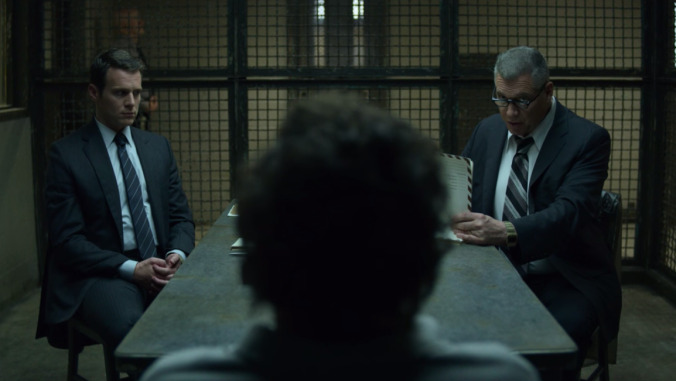Even Tench is feeling uneasy as Mindhunter dives deeper into season 2

The paranoia that underlaid the professional changes and interpersonal conflict of Mindhunter’s season-two premiere continues to seep through its second episode, and even the show’s most square-jawed paragon of midcentury masculinity is rattled. That, of course, would be Bill Tench, whose no-nonsense exterior only began to show signs of the haunted man within towards the end of the first season. The premiere made a point of showing Tench at home with his family, and although he was clearly annoyed at his wife Nancy’s (Stacey Roca) attempts to get him to socialize, things seemed to be going reasonably okay. His son is speaking and socializing with other kids, and the other dads in the neighborhood are clearly intrigued by his FBI war stories. Tench’s work is disturbing, but his home life is settled. Then a basement in Kansas undoes all of that.
Following another cold open in which Dennis Rader’s (Sonny Valicenti) wife puts him out on the couch with a kiss on the forehead and a copy of Therapeutic Approaches To Sexual Deviances, we jump to the Wichita airport. There, Tench is met by Detective Drowatzky (Jeb Kreager), a local police lieutenant seeking advice on an unsolved series of murders that have gripped the community for years. The killer calls himself BTK—“Bind, Torture, Kill”—and models himself after other famous serial killers, as Ford cannily observes later in the episode. But first we accompany Tench to the scene of what authorities believe to be BTK’s first kill: The sloppy but successfully executed murder of four members of the Otero family on January 15, 1974. (Rader eventually confessed to all four murders in 2005.) This is the first truly creepy sequence of the season so far, and director David Fincher incorporates crime-scene photos into Drowatzky and Tench’s tour of the now-abandoned house in a way that effectively conveys the flashbulbs of carnage that must go off in Tench’s mind when he sees ordinary household objects—like the pipe in the Otero’s basement on which 11-year-old Josephine Otero was hung and killed.
I was also very taken with the way Fincher filmed the scene where Tench questions Kevin Bright (Andrew Yackel), a victim who survived his encounter with the BTK Killer. Kevin’s sister Kathryn was not so lucky. Kevin is still so shook up from the experience three years later that he only agrees to meet with the lawmen in an empty parking garage in the pale blue light of early morning. (I think—the light’s pale blue a lot of the time on this show.) Bright refuses to talk to Tench unless Tench agrees not to look at him, and the way Fincher frames and focuses the scene so we never get a good look at Bright’s face puts an unsettlingly cold, impersonal spin on his highly emotional story. It’s vintage Fincher, and Holt McCallany’s facial expressions as he registers the horror of what’s being described is wonderful, subtle acting.
The same can be said for the subsequent scenes where Tench comes home to find his back door ajar, then sits down on the couch for a beer and a cigarette. The fact that we can read discomfort, and even fear, into Tench’s stoic expression is a testament to McCallany’s performance, as is the fact that he is able to project a closed-off, defensive wall onto a similar expression when Detective Art Spencer (Nate Corddry) comes to inform the Tenches of a murder in the neighborhood at the end of the episode. Now, I wasn’t alive in the 1970s, but people seem a lot more aware of, and paranoid about, crime now than they were during my childhood in the ‘80s, when our parents just let us wander around the neighborhood unattended all day. (Ironically, in contrast to this increased fear, serial homicide rates have been steadily falling since their peak in 1989.) But at the time, I don’t think many would have replied, “It happens everywhere, Nance,” as Tench does to Nancy’s shocked statement that things like that just don’t happen where they live.








































